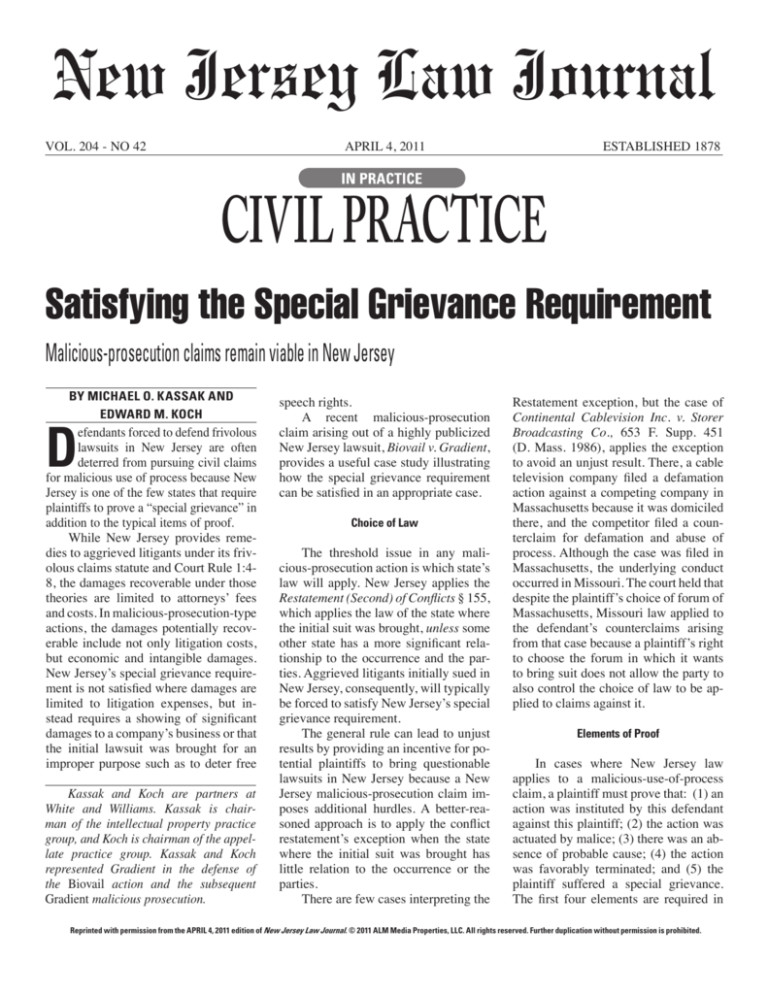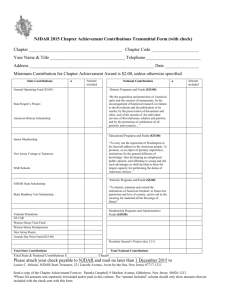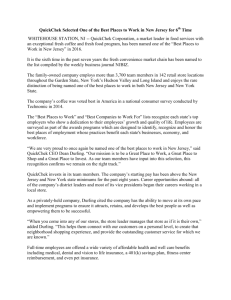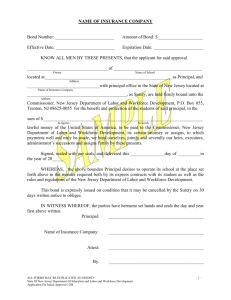
New Jersey Law Journal
VOL. 204 - NO 42
APRIL 4, 2011
ESTABLISHED 1878
CIVIL PRACTICE
Satisfying the Special Grievance Requirement
Malicious-prosecution claims remain viable in New Jersey
By Michael O. Kassak and
Edward M. Koch
D
efendants forced to defend frivolous
lawsuits in New Jersey are often
deterred from pursuing civil claims
for malicious use of process because New
Jersey is one of the few states that require
plaintiffs to prove a “special grievance” in
addition to the typical items of proof.
While New Jersey provides remedies to aggrieved litigants under its frivolous claims statute and Court Rule 1:48, the damages recoverable under those
theories are limited to attorneys’ fees
and costs. In malicious-prosecution-type
actions, the damages potentially recoverable include not only litigation costs,
but economic and intangible damages.
New Jersey’s special grievance requirement is not satisfied where damages are
limited to litigation expenses, but instead requires a showing of significant
damages to a company’s business or that
the initial lawsuit was brought for an
improper purpose such as to deter free
Kassak and Koch are partners at
White and Williams. Kassak is chairman of the intellectual property practice
group, and Koch is chairman of the appellate practice group. Kassak and Koch
represented Gradient in the defense of
the Biovail action and the subsequent
Gradient malicious prosecution.
speech rights.
A recent malicious-prosecution
claim arising out of a highly publicized
New Jersey lawsuit, Biovail v. Gradient,
provides a useful case study illustrating
how the special grievance requirement
can be satisfied in an appropriate case.
Choice of Law
The threshold issue in any malicious-prosecution action is which state’s
law will apply. New Jersey applies the
Restatement (Second) of Conflicts § 155,
which applies the law of the state where
the initial suit was brought, unless some
other state has a more significant relationship to the occurrence and the parties. Aggrieved litigants initially sued in
New Jersey, consequently, will typically
be forced to satisfy New Jersey’s special
grievance requirement.
The general rule can lead to unjust
results by providing an incentive for potential plaintiffs to bring questionable
lawsuits in New Jersey because a New
Jersey malicious-prosecution claim imposes additional hurdles. A better-reasoned approach is to apply the conflict
restatement’s exception when the state
where the initial suit was brought has
little relation to the occurrence or the
parties.
There are few cases interpreting the
Restatement exception, but the case of
Continental Cablevision Inc. v. Storer
Broadcasting Co., 653 F. Supp. 451
(D. Mass. 1986), applies the exception
to avoid an unjust result. There, a cable
television company filed a defamation
action against a competing company in
Massachusetts because it was domiciled
there, and the competitor filed a counterclaim for defamation and abuse of
process. Although the case was filed in
Massachusetts, the underlying conduct
occurred in Missouri. The court held that
despite the plaintiff’s choice of forum of
Massachusetts, Missouri law applied to
the defendant’s counterclaims arising
from that case because a plaintiff’s right
to choose the forum in which it wants
to bring suit does not allow the party to
also control the choice of law to be applied to claims against it.
Elements of Proof
In cases where New Jersey law
applies to a malicious-use-of-process
claim, a plaintiff must prove that: (1) an
action was instituted by this defendant
against this plaintiff; (2) the action was
actuated by malice; (3) there was an absence of probable cause; (4) the action
was favorably terminated; and (5) the
plaintiff suffered a special grievance.
The first four elements are required in
Reprinted with permission from the APRIL 4, 2011 edition of New Jersey Law Journal. © 2011 ALM Media Properties, LLC. All rights reserved. Further duplication without permission is prohibited.
2
all jurisdictions, but the special grievance
requirement is only required in a minority of states, including New Jersey.
To establish a special grievance
under New Jersey law, a plaintiff must
prove “interference with one’s liberty
or property.” LoBiondo v. Schwartz, 199
N.J. 62, 95 (N.J. 2009). In LoBiondo,
the plaintiffs filed suit in response to the
defendants’ protest of the plaintiffs’ construction project. The defendants crossclaimed for malicious use of process. The
court dismissed the plaintiffs’ claims,
finding that the suit was “obviously retaliatory” and designed to chill speech
regarding a matter of public concern. As
such, the court held that the defendants
stated a cause of action for malicious use
of process because they alleged that the
plaintiffs’ suit interfered with the defendants’ exercise of free speech and freedom to petition, and thus constituted an
interference with their liberty sufficient
to satisfy the special grievance element.
New Jersey courts have thus recognized
that a special grievance exists where the
consequence of the lawsuit was to not
only silence the defendant, but to deter
others who might speak out as well.
New Jersey courts have also found
that plaintiffs who sustained severe and
permanent economic damages as a result
of a lawsuit established a special grievance. In Giri v. Rutgers Cas. Ins. Co.,
273 N.J. Super. 340 (App. Div. 1994), the
plaintiff sued for malicious use of process, alleging that an unfounded lawsuit
by the defendant caused him to lose his
malpractice insurance and forced him to
temporarily close his practice. The court
found that because the plaintiff was temporarily put out of business, the damages
from the malicious lawsuit were “beyond
the routine ‘damages’ in the usual malpractice suit” and thus constituted a special grievance.
Based on LoBiondo and Giri, a malicious-prosecution plaintiff can satisfy
New Jersey’s special grievance requirement by establishing either that the initial lawsuit was brought to chill its First
Amendment or other important rights or
NEW JERSEY LAW JOURNAL, APRIL 4, 2011
that the initial lawsuit caused severe economic damages.
Gradient and Biovail
A recent malicious-prosecution lawsuit brought in Arizona, Gradient Analytics v. Biovail Corporation, No. CV-100335-PHX-FJM, (the Gradient action),
provides a useful illustration of the interpretation of New Jersey’s special grievance requirement. The Gradient action
arose out of Biovail Corporation’s 2006
New Jersey lawsuit, Biovail v. Gradient,
Docket No. ESX-L-1583-06 (the Biovail
action), against a number of defendants,
including Gradient Analytics Inc. (Gradient) and its principals. Gradient is an
independent research firm that analyzes
publicly traded companies for its subscribers.
The plaintiffs in the Biovail action
alleged a conspiracy in violation of the
New Jersey civil RICO statute, claiming that Gradient engaged in a conspiracy with a well-known hedge fund and
others to target certain publicly traded
companies and drive down the price of
their stock. Biovail further alleged that
Gradient allowed their subscribers to
ghostwrite their reports, and sent the
reports to them prior to releasing them,
enabling short sale of the stock (i.e., taking a financial position wagering that the
price will go down) and deriving profits
when the release of the negative reports
allegedly caused the stock prices to go
down.
When the Biovail action was filed,
Biovail secured the lead story on “60
Minutes,” where the conspiracy claims
were repeated. Soon after the Biovail
action was filed, however, the SEC, Ontario’s Security Commission and the Department of Justice filed actions against
Biovail for much of the same conduct
Gradient had exposed in its allegedly
fraudulent reports. Biovail subsequently
paid millions of dollars to resolve those
actions but refused to dismiss the Biovail
action. In August 2009, the New Jersey
Superior Court granted Gradient’s mo-
204 N.J.L.J. 43
tion to dismiss the Biovail action.
Gradient brought a subsequent malicious-prosecution claim against Biovail
in federal court in Arizona, alleging that
the Biovail action had been brought for
an improper purpose. Gradient’s complaint included a claim for economic
damages for the substantial damage to its
business caused by the Biovail action and
subsequent publicity. Biovail moved to
dismiss, arguing that New Jersey law applied and that Gradient’s complaint failed
to satisfy New Jersey’s special grievance
requirement. Gradient challenged the application of New Jersey law, claiming
that it had successfully argued that it was
not even subject to personal jurisdiction
in New Jersey. Gradient also argued that
even if New Jersey law applied, it was
able to establish a special grievance under both LoBiondo and Giri.
In analyzing the special grievance issue, the court concluded that New Jersey
law applied and that the Gradient complaint stated a cause of action for special
grievance. It held that based on the allegations in the complaint, Gradient raised
serious concerns about malfeasance by a
major publicly traded company, and Biovail sought to silence Gradient’s legitimate criticism through the Biovail action.
The court also concluded that the Gradient action alleged an economic special
grievance, thus rejecting the interpretation of Giri as requiring that plaintiffs
must have ceased all operations for some
period of time in order to make a claim
for an economic special grievance. The
court instead interpreted Giri as requiring that the plaintiff show harm beyond
routine damages in the defense of a frivolous lawsuit and that the economic damages in the Gradient action could easily
exceed those alleged in Giri.
In summary, aggrieved litigants who
suffer substantial economic damages or
whose free speech rights are deterred as a
result of a frivolous lawsuit should not be
discouraged from seeking redress in New
Jersey courts, because it is likely that such
a claim will survive despite New Jersey’s
special grievance requirement.








